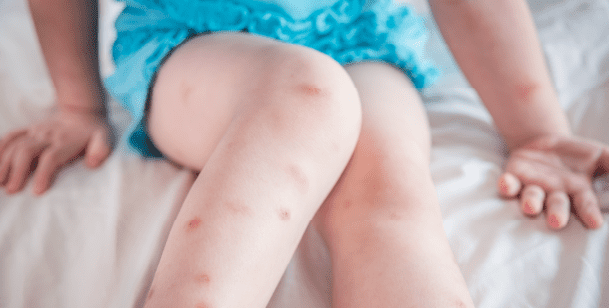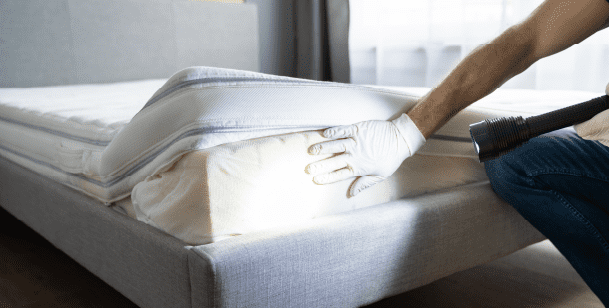No one likes to discover that they’ve been bitten by an insect. However, that feeling becomes worse when the bites are numerous and seem to be coming from inside the house. If you’ve experienced insect bites at home, the two most likely culprits are bed bugs or fleas. In this article, we examine bed bug bites vs. flea bites, explaining the key differences between them. Continue reading to learn more.
Bed Bugs
Bed bugs are small, flat, rusty brown insects that feed on human blood. They are attracted to body heat and carbon dioxide, which is why they are drawn to us while we sleep. Despite being called bed bugs, these insects can live in any fabric-based furniture, including couches, chairs, curtains, mattresses, and carpets, favoring fabric seams. They can also live inside and travel through small cracks in walls. It is important to note that the cleanliness of a home has nothing to do with the presence of bed bugs.
Humans do not often notice that they are being bitten by bed bugs as it happens because the bite of a bed bug has an anesthetic effect, meaning that it makes the bite site numb. For this reason, you may not realize that you’ve been bitten until the next morning.
Bed bug bites manifest as small marks on the skin, with a small raised point in the middle, similar to mosquito bites. These bites often appear in strategic linear rows, often zigzagged.
Other signs of bed bug bites include
- Linear welts
- Intense itchiness
- Bites on areas of the body exposed during sleep
- Bites in warm or moist areas, like the bends of elbows and knees
- Bites that are purple in color
Other signs that you may be dealing with the presence of bed bugs include
- Rust or brown colored spots appearing on your mattress. These spots are left when bed bugs are popped. They may appear if you roll over bed bugs during your sleep.
- Shedded insect skins; bed bugs shed their skin as they grow. If bed bugs are present in your home for an extended period of time, you may notice the small, leaf-like husks they leave behind.
- A musty odor caused by bed bug sweat glands
Bed bugs carry no infectious diseases and, for this reason, are usually no more than a nuisance to humans. However, if you are allergic to bug bites and bed bug bites, you may experience an allergic reaction.

Fleas
Fleas, unlike bed bugs, prefer to live on animal blood, only biting humans as a last resort. If you have recently been exposed to animals and find a bug bite, there is a chance it may have come from a flea.
Flea and bed bug bites both appear as small red dots, closely resembling a mosquito bite. However, the main difference between bed bug bites vs. flea bites can be found in the bite pattern.
While bed bug bites usually appear in a straight line across the skin, flea bites on the same skin would be located much more randomly, usually appearing in small clusters with three small red bumps grouped together.
Other signs that denote a flea bite include
- Bites that appear anywhere or in many locations on the body
- Bites that are itchy
- Dark red bites that turn into blisters
Signs that you may be experiencing a flea infestation include
- Pets biting or scratching excessively
- Red spots on pets’ coats
- Small bugs appearing on furniture or skin
- Red patches on pet skin
- Pet hair loss
Fleas bites can be dangerous because some fleas carry bacteria and spread diseases that are harmful to humans. Flea bites may also cause an allergic reaction in some people.

Treatment for Bed Bug and Flea Bites
For both flea and bed bug bites, it is important to avoid scratching, as scratching may cause bites to get worse. Bites that turn into blisters and pop are vulnerable to a variety of skin infections. If you do develop a secondary infection after scratching bug bites, seek medical attention immediately, visit village EC for ER for bug bites.
To treat bed bug bites and flea bites, apply a topical anti-itch cream to your bites to alleviate itching and discomfort. You may also take an antihistamine to help mitigate symptoms associated with an allergic reaction.
For Fleas:
To address the presence of fleas in your home, DEET spray can be an effective tool for keeping away fleas and preventing them from biting you. Make sure the grass in your yard is cut very short, removing the fleas’ natural habitat. Additionally, you will want to make sure that your pets are on proper flea medication to alleviate their symptoms and to help keep fleas out of your home.
For Bed Bugs:
To attempt to deal with bed bugs on your own, clean your home thoroughly. Vacuum everywhere and immediately dispose of the vacuum bag outside the house. Wash bedding with extremely hot water and dry at a high temperature, as bed bugs cannot survive in intense heat. Invest in a mattress casing to protect your bed. Living bed bugs can be killed immediately by coming into contact with rubbing alcohol.
A large flea or bed bug infestation will likely require intervention from professional pest control workers.
Get Help from Village Emergency Centers
For severe allergic reactions to flea or bed bug bites, seek help from trained medical professionals immediately. You can always rely on Village Emergency Centers for prompt and compassionate care. With convenient locations in Jersey Village, and League City, our board-certified doctors are available 24/7 to handle all your emergency needs. To learn more about our services and to find your nearest Village EC, visit our website today!
